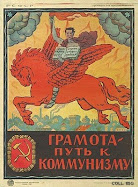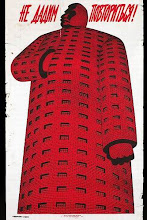Aleksandr Isayevich Solzhenitsyn was born into a smoldering world, a month after Germany signed the armistice on November 11, 1918, bringing World War I to a close. He was brought into being during the Russian Civil War, during the first faltering steps of the establishment of Bolshevik power in Russia. The only Russia he knew was Communist Russia; until his arrest, he did not question Marxist-Leninist ideology.
 While serving as an officer in the Red Army during the Great Patriotic War (World War II to us amerikantsi), he was arrested by the secret police. Tortured at the Lubyanka -- the notorious KGB headquarters near the heart of Moscow -- he was soon convicted under Article 58, paragraphs 10 and 11 of the penal code of Soviet Russia. His crime? Critical remarks about the conduct of the war, written within months of victory in 1945. A few words folded in a triangular envelope and sent to a friend. Private thoughts shared from a low ranking officer that would never have again been read, a stone so small that it would not have caused the slightest ripple.
While serving as an officer in the Red Army during the Great Patriotic War (World War II to us amerikantsi), he was arrested by the secret police. Tortured at the Lubyanka -- the notorious KGB headquarters near the heart of Moscow -- he was soon convicted under Article 58, paragraphs 10 and 11 of the penal code of Soviet Russia. His crime? Critical remarks about the conduct of the war, written within months of victory in 1945. A few words folded in a triangular envelope and sent to a friend. Private thoughts shared from a low ranking officer that would never have again been read, a stone so small that it would not have caused the slightest ripple.
Punishing this so-called "anti-Soviet and counterrevolutionary propaganda" with over eight years in the corrective labor camps, the Chekists helped to set in motion the end of the Soviet regime. They got in return works of literature and investigative journalism that, as much as any other individual act, brought down the Soviet Union. Not right away; the red wheel had more turns to make before finishing its revolution. But the regime could not reconcile its foundational narrative -- that it was liberating the proletariat from the degradation of capitalism -- with the reality that its "workers' paradise" was actually built by millions of forced laborers, made to toil in secret camps throughout the Soviet Union. The overwhelming majority of whom were, like Solzhenitsyn, imprisoned for no sensible reason.
Solzhenitsyn revealed that the GULAG -- an official acronym for the head administration of labor and corrective camps -- was not an aberration of what was otherwise a noble human endeavor, but was the central cog that made the entire engine run; the prison system was the root, rotting and diseased, spread underneath the dying tree of the Soviet state.
His life stretched out longer than the USSR itself. He survived to see his beloved homeland fall out from under the thumb of the Communist Party of the Soviet Union and into desperate, chaotic, robber-baron capitalism. He lived to scold his comrades for their fascination with consumerism. He believed in Russia, in her people, in her great and powerful language. Not that he can be praised without qualification. His rants against the vacuousness of contemporary culture veered into the comic; his drifts into jingoism and antisemitism were tragic. Moreover, the nationalism he embraced could easily run out of hand and carry his motherland headlong back into a police state. And it is hard to reconcile his love for the current leadership of Russia -- made up as it is by former KGB officers -- with his own heroic struggle against the KGB's crimes against the Soviet people.
 But today he was put to rest. Today he is lowered into the ground at Donskoi Monastery. Today he should be remembered.
But today he was put to rest. Today he is lowered into the ground at Donskoi Monastery. Today he should be remembered.
The President of Russia has already proclaimed that Solzhenitsyn will be memorialized by an official scholarship in his name. Medvedev has asked the Moscow government to name a street in his honor. No doubt there will be other monuments.
But he has left us a more enduring monument than any boulevard or avenue: his words , his story. He has left us his legacy, a story of human struggle to write truth to the state, a story of vigilance and discipline pitted against raw, brute power. His of course were not the only stories of life in the GULAG, but his spread the furthest and left the biggest mark.
Here's to the strength of language. To the power of Russian, which survived a totalitarian effort to tame it, to yoke it to crude, ideological ends -- and whose poetry instead provided refuge through long, dark times. To the truth that human institutions are inherently fallible and corruptible, that they need to be watched, investigated, and held accountable. To the writers who help us see.
Here's to the man from Kislovodsk who endured.
царствие небесное.
 While serving as an officer in the Red Army during the Great Patriotic War (World War II to us amerikantsi), he was arrested by the secret police. Tortured at the Lubyanka -- the notorious KGB headquarters near the heart of Moscow -- he was soon convicted under Article 58, paragraphs 10 and 11 of the penal code of Soviet Russia. His crime? Critical remarks about the conduct of the war, written within months of victory in 1945. A few words folded in a triangular envelope and sent to a friend. Private thoughts shared from a low ranking officer that would never have again been read, a stone so small that it would not have caused the slightest ripple.
While serving as an officer in the Red Army during the Great Patriotic War (World War II to us amerikantsi), he was arrested by the secret police. Tortured at the Lubyanka -- the notorious KGB headquarters near the heart of Moscow -- he was soon convicted under Article 58, paragraphs 10 and 11 of the penal code of Soviet Russia. His crime? Critical remarks about the conduct of the war, written within months of victory in 1945. A few words folded in a triangular envelope and sent to a friend. Private thoughts shared from a low ranking officer that would never have again been read, a stone so small that it would not have caused the slightest ripple.Punishing this so-called "anti-Soviet and counterrevolutionary propaganda" with over eight years in the corrective labor camps, the Chekists helped to set in motion the end of the Soviet regime. They got in return works of literature and investigative journalism that, as much as any other individual act, brought down the Soviet Union. Not right away; the red wheel had more turns to make before finishing its revolution. But the regime could not reconcile its foundational narrative -- that it was liberating the proletariat from the degradation of capitalism -- with the reality that its "workers' paradise" was actually built by millions of forced laborers, made to toil in secret camps throughout the Soviet Union. The overwhelming majority of whom were, like Solzhenitsyn, imprisoned for no sensible reason.
Solzhenitsyn revealed that the GULAG -- an official acronym for the head administration of labor and corrective camps -- was not an aberration of what was otherwise a noble human endeavor, but was the central cog that made the entire engine run; the prison system was the root, rotting and diseased, spread underneath the dying tree of the Soviet state.
His life stretched out longer than the USSR itself. He survived to see his beloved homeland fall out from under the thumb of the Communist Party of the Soviet Union and into desperate, chaotic, robber-baron capitalism. He lived to scold his comrades for their fascination with consumerism. He believed in Russia, in her people, in her great and powerful language. Not that he can be praised without qualification. His rants against the vacuousness of contemporary culture veered into the comic; his drifts into jingoism and antisemitism were tragic. Moreover, the nationalism he embraced could easily run out of hand and carry his motherland headlong back into a police state. And it is hard to reconcile his love for the current leadership of Russia -- made up as it is by former KGB officers -- with his own heroic struggle against the KGB's crimes against the Soviet people.
 But today he was put to rest. Today he is lowered into the ground at Donskoi Monastery. Today he should be remembered.
But today he was put to rest. Today he is lowered into the ground at Donskoi Monastery. Today he should be remembered.The President of Russia has already proclaimed that Solzhenitsyn will be memorialized by an official scholarship in his name. Medvedev has asked the Moscow government to name a street in his honor. No doubt there will be other monuments.
But he has left us a more enduring monument than any boulevard or avenue: his words , his story. He has left us his legacy, a story of human struggle to write truth to the state, a story of vigilance and discipline pitted against raw, brute power. His of course were not the only stories of life in the GULAG, but his spread the furthest and left the biggest mark.
Here's to the strength of language. To the power of Russian, which survived a totalitarian effort to tame it, to yoke it to crude, ideological ends -- and whose poetry instead provided refuge through long, dark times. To the truth that human institutions are inherently fallible and corruptible, that they need to be watched, investigated, and held accountable. To the writers who help us see.
Here's to the man from Kislovodsk who endured.
царствие небесное.










1 comment:
This is a brilliant name for a blog! I love it! Russian culture is so fascinating - I look forward to reading more. Well, I actually have not had time to read this one yet.
Post a Comment